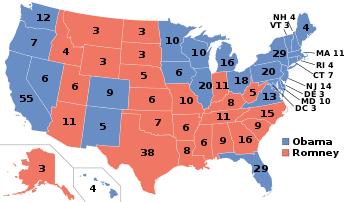| |||||||||||||||||||||||||||||
538 members of the Electoral College 270 electoral votes needed to win | |||||||||||||||||||||||||||||
|---|---|---|---|---|---|---|---|---|---|---|---|---|---|---|---|---|---|---|---|---|---|---|---|---|---|---|---|---|---|
| Opinion polls | |||||||||||||||||||||||||||||
| Turnout | 58.6%[1] | ||||||||||||||||||||||||||||
| |||||||||||||||||||||||||||||
 Presidential election results map. Blue denotes states won by Obama/Biden and red denotes those won by Romney/Ryan. Numbers indicate electoral votes cast by each state and the District of Columbia. | |||||||||||||||||||||||||||||
| |||||||||||||||||||||||||||||
| Democratic Party | |
|---|---|
| Republican Party | |
| Minor parties | |
| Related races | |
| |
The 2012 United States presidential election was the 57th quadrennial presidential election, held on Tuesday, November 6, 2012. Incumbent Democratic President Barack Obama and his running mate, incumbent Vice President Joe Biden, were elected to a second term.[3] They defeated the Republican ticket of former Governor of Massachusetts Mitt Romney and U.S. Representative Paul Ryan of Wisconsin, who later became Speaker of the House of Representatives.
As the incumbent President, Obama secured the Democratic nomination without serious opposition. The Republicans experienced a competitive primary. Romney was consistently competitive in the polls and won the support of many party leaders, but he faced challenges from a number of more conservative contenders. Romney secured his party's nomination in May, defeating former senator Rick Santorum, former Speaker of the House Newt Gingrich, and Texas congressman Ron Paul, among other candidates.
The campaigns focused heavily on domestic issues, and debate centered largely around sound responses to the Great Recession. Other issues included long-term federal budget issues, the future of social insurance programs, and the Affordable Care Act, Obama's marquee legislative program. Foreign policy was also discussed, including the end of the Iraq War in 2011, military spending, the Iranian nuclear program, and appropriate counteractions to terrorism. Romney attacked Obama's domestic policies as ineffective and financially insolvent while Obama's campaign sought to characterize Romney as a plutocratic businessman who was out of touch with the average American.[4][5] The campaign was marked by a sharp rise in fundraising, including from nominally independent Super PACs.
Obama defeated Romney, winning a majority of both the Electoral College and the popular vote. Obama won 332 electoral votes and 51.1% of the popular vote compared to Romney's 206 electoral votes and 47.2%.[2] The results of the electoral vote were certified by Congress on January 4, 2013.[6] Obama was the first president since Ronald Reagan in 1984 to win a majority of the national popular vote more than once, and the first Democrat to do so since Franklin D. Roosevelt in 1944. Obama also became only the fifth Democratic president in history to win a second consecutive term after Andrew Jackson, Woodrow Wilson, Franklin D. Roosevelt, and Bill Clinton, as well as the third sitting president in a row (after Clinton and George W. Bush) to win a second term. As of 2024, this remains the last U.S. presidential election in which an incumbent president won re-election to a second consecutive term and the last U.S. presidential election in which the incumbent White House party won the election.
Obama did not hold onto Indiana, North Carolina, or Nebraska's 2nd congressional district, but crucially won all 18 "blue wall" states and defeated Romney in other swing states the Republicans had won in 2000 and 2004, most notably Colorado, Florida, Nevada, Ohio, and Virginia. Ultimately, of the nine swing states identified by The Washington Post in the 2012 election, Obama won eight, losing only North Carolina.[7] This is the most recent presidential election in which the Democratic candidate won the states of Iowa, Ohio, and Florida, along with Maine's 2nd congressional district, the most recent in which neither major party's ticket included a woman, and the most recent in which Donald Trump was not the Republican nominee.
All four major candidates for president and vice president went on to hold significant public office after this election. Obama served his second term as president, while Biden also served his second term as vice president and initially retired from politics but was later elected president in 2020, defeating Obama's successor, then-incumbent Donald Trump. This is the most recent election in which two major party nominees would go on to become president. Romney moved to Utah in 2014 and was elected to the Senate there in 2018, succeeding Orrin Hatch. Ryan served three more terms in the House and eventually became Speaker from 2015 until his retirement from politics in 2019.
- ^ "National General Election VEP Turnout Rates, 1789-Present". United States Election Project. CQ Press. Archived from the original on July 25, 2014. Retrieved February 28, 2023.
- ^ a b c "Federal Elections 2012" (PDF). Federal Election Commission. Washington, D.C. 2013. Archived (PDF) from the original on December 2, 2019. Retrieved January 20, 2021.
- ^ Fahrenthold, David A. (May 18, 2023). "Obama reelected as president". Washington Post. ISSN 0190-8286. Archived from the original on April 17, 2015. Retrieved March 20, 2024.
- ^ "Obama: Romney is out of touch". The Christian Science Monitor. September 20, 2012. Archived from the original on December 11, 2022. Retrieved December 11, 2022.
- ^ "Romney hits Obama on deficit". Politico. May 16, 2012. Archived from the original on December 11, 2022. Retrieved December 11, 2022.
- ^ Congressional Record at H50 (January 4, 2013).
- ^ Cillizza, Chris (April 16, 2012). "The 9 swing states of 2012". Washington Post. Archived from the original on January 26, 2021. Retrieved May 19, 2021.

